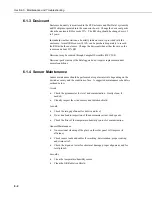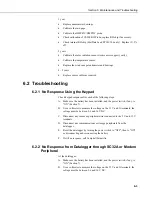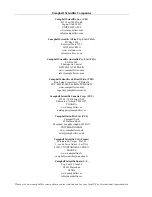
6-1
Section 6. Maintenance and
Troubleshooting
These guidelines apply to several different Campbell Scientific weather stations.
6.1 Maintenance
Proper maintenance of weather station components is essential to obtain
accurate data. Equipment must be in good operating condition, which requires
a program of regular inspection and maintenance. Routine and simple
maintenance can be accomplished by the person in charge of the weather
station. More difficult maintenance such as sensor calibration, sensor
performance testing (i.e., bearing torque), and sensor component replacement,
generally requires a skilled technician, or that the instrument be sent to
Campbell Scientific or the manufacturer.
A station log should be maintained for each weather station that includes serial
numbers, dates that the site was visited, and maintenance that was performed.
6.1.1 Instrumentation Maintenance
The instrumentation requires a minimum of routine maintenance. A few
preventative maintenance steps will optimize battery life and decrease the
chances of datalogger failure.
6.1.2 Batteries
Instruction 10 can be used to measure battery voltage. By recording battery
voltage the user can determine how long a fresh set of batteries will last (see the
Installation Section of the datalogger Operator's Manual for cold temperature
effects on alkaline batteries). Short Cut and ETPro automatically program the
weather station to measure battery voltage.
When alkaline batteries are used, the battery voltage should not be allowed to
drop below 9.6 VDC before replacement. Where CR10 or 21X dataloggers are
used in the instrumentation, an external battery must be used to maintain power
to the datalogger when changing batteries, otherwise the clock, program, and
data will be lost (refer to the Installation Section of the datalogger's Operator's
Manual for details). When not in use, remove the eight cells to eliminate
potential corrosion of the contact points, and store in a cool dry place.
Rechargeable power supplies should be connected to an AC transformer or
unregulated solar panel at all times. The charge indicating diode should be
"ON" when voltage to the charging circuitry is present. Be aware of battery
voltage that consistently decreases over time, which indicates a failure in the
charging circuitry.
Summary of Contents for ET106
Page 4: ...This is a blank page...
Page 20: ...Section 2 ET Tower Installation 2 6 This is a blank page...
Page 34: ...Section 3 ET Instrumentation Installation 3 14 This is a blank page...
Page 44: ...Section 5 ET Software Installation 5 2 This is a blank page...
Page 50: ...Section 6 Maintenance and Troubleshooting 6 6 This is a blank page...
Page 51: ...This is a blank page...








































